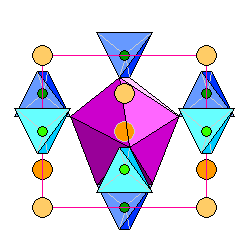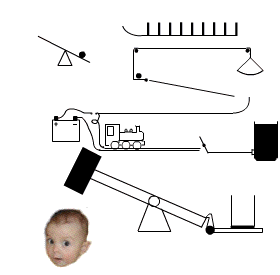View current page
...more recent posts
The Washington Establishment--Life During Wartime
From the New York Times:
A few nights after he resigned his post as secretary of state two years ago, Colin L. Powell answered a ring at his front door. Standing outside was Prince Bandar, then Saudi Arabia’s ambassador to the United States, with a 1995 Jaguar. Mr. Powell’s wife, Alma, had once mentioned that she missed their 1995 Jaguar, which she and her husband had traded in. Prince Bandar had filed that information away, and presented the Powells that night with an identical, 10-year-old model. The Powells kept the car — a gift that the State Department said was legal — but recently traded it away.From the Daily Howler:
POWELL (10/14/04): Every couple of years, Ted [Koppel] will come by my house on the spur of the moment and we'll sit in the back yard and have a cup of coffee. And he's usually driving one of his hot cars. He always has a fast car of some kind. And so about, oh, four or five years ago, he came by the house and he had this real muscle car, and after we had a cup of coffee and chatted for a while, he says, “You've got to take it out and drive it, Colin. You've just got to drive this thing. I want you to feel that power.”
I said, “Okay, Ted. You want to go with me?”
“No, you go. I'll just wait right here in front of the house.”
And so I go out and up 123 in McLean. I will not tell anyone how fast I was going by the time I hit the CIA turnoff, but it didn't take me long to get there. And I came back around, pulled up in front of my driveway, and felt something go boom. And I got out of the car and the right rear tire was flat. There must have been about two inches of air left in it.
I said, “Oh, my gosh, Ted. I'm so sorry. I messed up your car.”
And he comes back, “Oh, it's okay, it's okay. I've got to go now.”
So I went to the back of the car and I looked at the tire. There was no tread on it. The wires were coming through. This guy had sent me out to speed up and down 123 with this car that had no tires on it. And I said, “Ted, how much are they paying you at ABC, man? Surely you can do better than this.”
Travis Hallenbeck found this online "build-a-face" program that excels at making rather hideous visages, as he has demonstrated. No one can touch


Juan Cole's plan for Iraq: the US announces it's withdrawing but sticks around to help negotiate a settlement. To be sung to the tune of "It's Getting Better" or "I Whistle a Happy Tune."
Saudi Arabia's King Abdullah has credibility with Iraq's Sunnis, especially now that he has denounced the US occupation as illegitimate. They could trust his representations, which would include Saudi development aid in places like Anbar province. Since the Sunnis are the main drivers of violence in Iraq, it is they who must be mollified, bribed, cajoled and threatened into a settlement. The Shiites will have to demobilize the Mahdi Army and Badr Organization as well, and Iran will have to commit to working with the Maliki government to make that happen. A UN peacekeeping force, perhaps with the OIC (where Malaysia recently proffered troops), would be part of the solution.And bunnies and kittens will scamper through the fields...
On the basis of a settlement at Taif II, the US military should then negotiate with provincial authorities a phased withdrawal from the Sunni Arab provinces. The Sunnis will have to understand that this departure is a double-edged sword, since if they continued their guerrilla war, the United States could not protect them from Kurdish or Shiite reprisals. Any UN or OIC presence would be for peacekeeping and could not be depended on for active peace-enforcing. The rewards from neighbors promised at Taif II should be granted in a phased fashion and made dependent on good-faith follow-through by Iraqi leaders.
From all this the Sunni Arabs would get an end to the US occupation--among their main demands--as well as an end to de-Baathification and political marginalization. They would have an important place in the new order and be guaranteed their fair share of the national wealth. Shiites and Kurds would get an end to a debilitating civil war, even if they have to give up some of their maximal demands. The neighbors would avoid a reprise of the destructive Iran-Iraq War of the 1980s, which killed perhaps a million people and deeply damaged regional economies. And by ending its occupation, the United States would go a long way toward repairing its relations with the Arab and Muslim world and thus eliminate one of Al Qaeda's chief recruiting tools. A withdrawal is risky, but on the evidence so far, for the US military to remain in Iraq is a sure recipe for disaster.
Why in the world would the Iraqis ever trust the US government to handle this? They don't want to be plundered and exploited by stateless capital any more than the rest of us do.


Zircon structure - top and side views. From website for Steven Dutch's earth science class at University of Wisconsin - Green Bay (this is his personal site, not the school's--either way, the drawings are great). More (hat tip to Travis)
Sounds like Mike Gravel was the hero of last night's Democrat candidate debates (I didn't watch--just read the postmortems). Interesting to see the differences between antiwar.com's account, which quotes Gravel's plainspoken words skewering the other candidates, and the New York Times version, which hews to the line that he was the "comic relief" and marginalizes his contributions. Dave, in the comments, said he was a bit dotty but his words certainly aren't. Here's the antiwar.com version.
Gravel...got the issues of war and peace exactly right.
Some of these people [the other candidates] frighten me. When you have mainline candidates that turn around and say "there's nothing off the table with respect to Iran. That's code for using nukes, nuclear devices. I’ve got to tell you, if I'm President of the United States, there will be no preemptive wars with nuclear devices. In my mind, it's immoral, and it’s been immoral for the last 50 years as part of American foreign policy.
Moderator Brian Williams then asked Gravel who on this stage worries him so much. Gravel said the top tier candidates worried him.
Gravel first took aim at Joe Biden:
Joe, you have a certain arrogance, you want to tell the Iraqis how to run their country. We should just play "get out." It's their country, they're asking us to leave, and we insist on staying there, why not get out. You hear the statement, "the soldiers will have died in vain." The entire deaths of Vietnam died in vain. You know what's worse than a soldier dying in vain? More soldiers dying in vain.
Gravel slammed fellow Democrats' approach on continuing to fund the war:
Well, first off, understand that this war was lost the day that George Bush invaded Iraq on a fraudulent basis. Understand that. Now with respect to what’s going on in the Congress, I'm really embarrassed. So we passed – and the media's in a frenzy right today with what has been passed. What has been passed? George Bush communicated over a year ago that he would not get out of Iraq until he left office. Do we not believe him?
Gravel’s alternative:
How do you get out? You pass the law, not a resolution, a law making it a felony to stay there.
Make the illegal war actually illegal. That’s the ticket!
But the best moment came after Barack Obama said that Iran having nuclear weapons will be a major threat to the US: "They are in the process of obtaining nuclear weapons. I don’t think that is disputed by any expert." (At this point, Kucinich interrupted that it is disputed.) Barack continued: "They are the biggest state sponsor of terrorism, with Hezbollah and Hamas." Kucinich continued to interrupt. Obama then talked of the risk of nuclear weapons reaching the hands of terrorists.
Gravel (who happily was next in line) confronted Obama:
We’ve sanctioned them [Iran] for 26 years. We scared the bejesus out of them when the President said they’re "evil." These things don’t work. We need to recognize them.

artist unknown
"Labyrinth Remixed" [2.8 MB .mp3]
Shorter, digitally rearranged version of ex-Happy the Man keyboardist Kit Watkins' instrumental prog anthem "Labyrinth" (1981). Took what I consider the "essential riff" (four variations of the same tune, plus a bridge) and jettisoned all the classical dynamics, theatrics, and buildups as well as expressive soloing. Reordered the riffs and overlayed them to make new counterpoint, thus turning a progressive rock song into a techno-prog song--kind of sped-up Philip Glass, what I always wanted to hear when I played this. Some excellent "real time" keyboard and drumming being massaged here--but I am interested in the song's "money shot"--structures of the sublime in their most compact form.
A few posts back a "wandering POV of a wandering POV" was discussed--a shaky, panning YouTube video documenting Linda Post's shaky, panning video perambulation through a cornfield. Here's another variation (thx AFC): John Michael Boling's YouTube of a video panning along a block of strip malls. The standard YouTube screen framing the action scrolls slowly from right to left using the "marquee" browser command, making its position on your screen in constant "slow and go" tension with the position of the camera's viewfinder. The video's continuous "tracking shot" is roughly panoramic, whereas the YT starts over at your screen's right as soon as it reaches the left side, creating what feels at times like an impossible folded space.
In both scenarios (James Kalm's Linda Post video isn't a piece per se but an inevitable meta extension of the Post), recursiveness is the watchword, in form (a picture within a picture) and in content: Post's video references cornfield tracking shots (from North by Northwest to Children of the Corn) and Boling's obliquely channels Ed Ruscha's Every Building on the Sunset Strip.
If we had an Adorno he might say such dual recursiveness is a distinguishing feature of 21st Century art, or at the very least Web 2.0 art.
